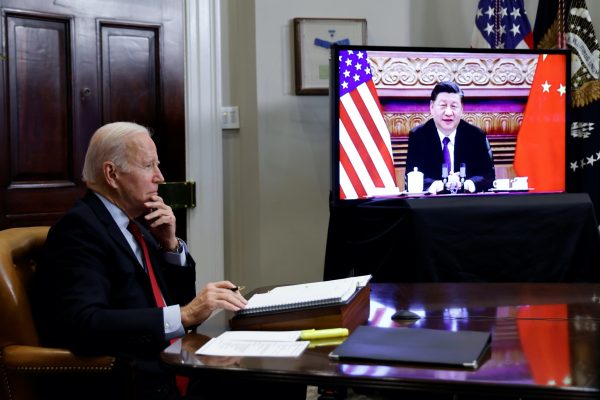This false ideological dichotomy inhibits sophisticated analysis. It will intensify global polarisation and fuel geopolitical competition at a time when international solidarity is desperately needed to deal with climate change and other shared challenges.
There is some truth to Biden’s categorisation. The conflict between Washington and Beijing is about political values and the ways in which society, economy, trade and technology are managed. Yet Washington and Beijing share many similarities. Both have implemented top-down developmental state measures in, for example, promoting their respective high-tech sectors.
Both the United States and China fall within the broadest definition of a capitalist system, with the former characterised by the domination of private capital and the latter by state-owned enterprises. The rivalry between the two countries should therefore be seen as a competition between different economic models within the same overarching capitalist system.
The democracy-versus-autocracy framework provides a poor foundation for the ‘new Cold War’ between the United States and China. Unlike the Cold War, in which US–Soviet contestation took place along liberalist-capitalist and socialist-communist lines, the ‘new Cold War’ is not an ideological, religious- or civilisation-inspired conflict characterised by overt attacks on each country’s way of life. The ideological battle between Washington and Beijing plays out on a level far below that of the Cold War.
Democracy is hardly the guiding principle behind US engagement in Asia. While democracy has provided a solid basis for the AUKUS agreement between Australia, the United Kingdom and the United States, others argue that the agreement’s real foundations are a white racial heritage and these countries’ shared history and culture. Indonesia, ASEAN’s largest democracy, has expressed its deep concern with AUKUS.
Democracy is also a weak foundation for the Quadrilateral Security Dialogue, which India joined for the sake of geopolitics, not democracy. India is becoming increasingly despotic as Prime Minister Narendra Modi promotes his brand of Hindu nationalism.
Biden’s democracy-versus-autocracy framework overlooks the complexities of China’s political system — in which village elections, participatory budgeting and local deliberative democracy have developed — overestimating the nature and scale of Chinese ideology. Beijing’s promotion of socialism at home is intended as a means of domestic control rather than reflecting any ideological fealty. It is a predominantly domestic affair, a key component in its internal security strategy.
Chinese President Xi Jinping’s sponsorship of socialist discourse is primarily aimed at preventing domestic social unrest. Under his predecessor Hu Jintao, funding for Chinese internal security services exceeded that of the military budget. Clearly, such an approach is financially unsustainable, so Xi has deployed more ideological forms of control to achieve social stability.
China’s support for authoritarian states should not be conflated with active promotion of its socialist model globally. While China’s support has helped some authoritarian states avoid crisis and collapse, it has also provided support to democratic countries, like Italy and Greece. China’s assistance to some authoritarian states should not be mistaken for a desire to establish an authoritarian coalition or bloc in opposition to the US coalition of democracies.
Security cooperation among China, Russia and Iran is not based on shared authoritarian or ideological values, but rather is driven by pressure from Washington. The interpretation that they represent a coalition of authoritarian states is misleading. Beijing understands well that authoritarianism alone is not a sufficient foundation for a coalition.
Overplaying the democracy-versus-autocracy narrative could foster feelings of alienation and resentment in Asia. Indonesia, Singapore and Thailand all have reservations about US-style democracy. By embracing certain countries and excluding others, Biden risks creating new divisions among US-friendly states. Perhaps Biden could instead learn from Indonesia’s inclusive approach, under which most Asian countries — including China and Russia — are invited to participate in the Bali Democracy Forum.
Any ideologically-based rivalry should be deemed unnecessary. As Kishore Mahbubani argues, ‘by treating the new China challenge as akin to the old Soviet strategy, America is making the classic strategic mistake of fighting tomorrow’s war with yesterday’s strategies’.
Ideological reconciliation between the United States and China is possible if the United States can work out a middle position that recognises some elements of China’s promotion of the right to development. Perhaps Biden’s grandchildren will follow his advice of ‘doing their doctoral thesis on the issue of who succeeded: autocracy or democracy’. They would be in a better position to judge whether Biden overcomes the misguided dichotomy between democracy and autocracy and averts a dangerous ‘new Cold War’.
Baogang He is Professor and Chair of International Relations at Deakin University.


US thinks they have the best form of government and is bent on exporting it to the rest of the world. This cannot be out of altruism, but is a policy to forge a global alliance under its control, as an effective bulwark against a competing rival. It was the Soviet Union in the past; it is China today. US was at the peak of its power and could handle the Soviet Union. Today US is running out of money and has to increasingly look for support from its allies to maintain its hegemony and supremacy. The Democracy Summit is US attempt clutching at straws..